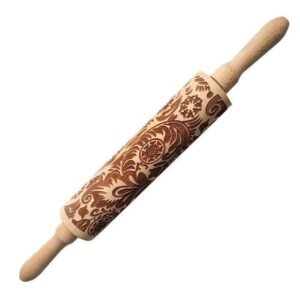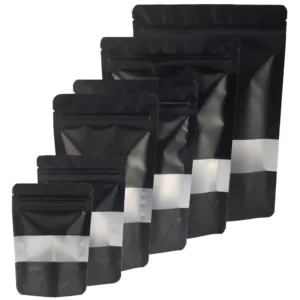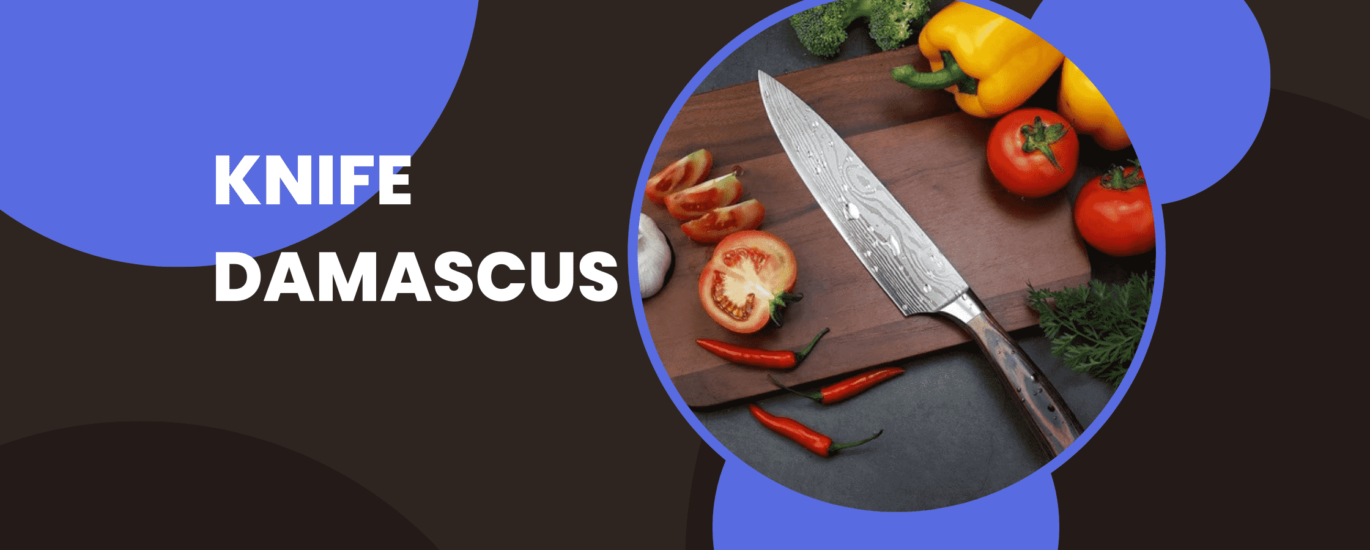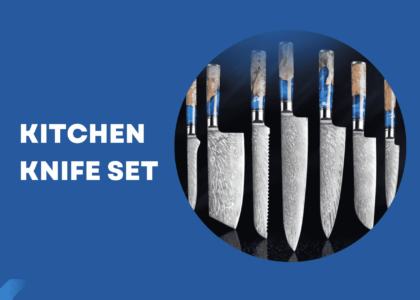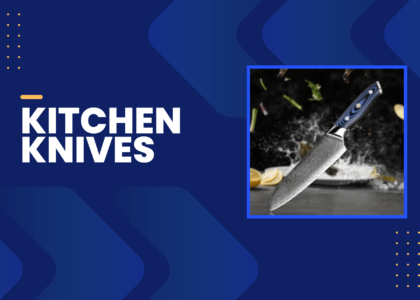Introduction
In the realm of cutlery, Knife Damascus stands as a pinnacle of craftsmanship and performance. Renowned for its distinctive wavy patterns, each piece tells a story of art meeting functionality. This blend not only promises durability but also a legacy carried through each slice.
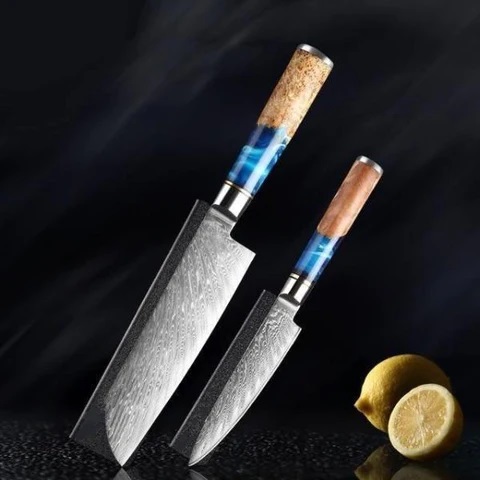
History and Origin of Damascus Steel
Tracing back to the 4th century, the artistry of Damascus steel originated in the Middle East. Named after the city of Damascus, this steel gained fame through the “crusader period,” admired for its hardness and razor-sharp edges. Craftsmen employed a secretive process, often lost in history, involving layering iron and steel, followed by several forging and folding techniques. This meticulous practice led to the creation of the legendary swords known in tales, characterized by their unique patterns resembling flowing water.
Why Damascus Steel is Revered
Damascus steel’s reverence is due to its unparalleled qualities in sharpness, resilience, and aesthetic appeal. Below are key reasons why it stands out:
- Sharpness: The forging process aligns the steel’s microstructure, offering an edge that remains sharp over prolonged use.
- Durability: Unlike ordinary steel, Damascus withstands pressure and resistance, attributed to its layered structure.
- Aesthetic Majesty: Beyond functionality, the intricate patterns on Damascus knives are visual artistry, appealing to collectors and chefs alike.
In the table below, we highlight the comparative advantages of Damascus steel:
| Feature | Damascus Steel | Traditional Steel |
|---|---|---|
| Sharpness | High | Moderate |
| Durability | Excellent | Varies |
| Aesthetic Appeal | Distinctive | Plain |
From professional chefs to enthusiasts, the allure of Damascus steel lies in its superior performance, historical significance, and the artistic statement it makes, thereby making it a prized possession in kitchens around the globe.
Understanding the Craftsmanship of Knife Damascus
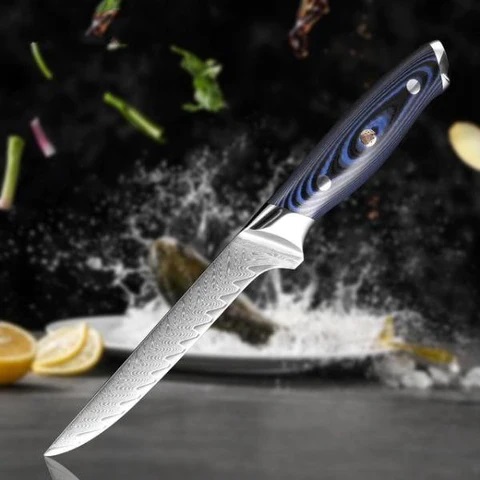
Delving deeper into the world of Knife Damascus, it’s essential to unravel the craftsmanship behind these masterpieces. This section sheds light on the transformative journey from raw materials to exquisite blades and explores the unique characteristics that set Damascus knives apart.
The Making Process: From Raw Steel to a Blade
The creation of a Damascus knife is nothing short of alchemy. It begins with selecting the finest raw steel blades, known for high carbon content, ensuring the blades’ eventual sharpness and strength. What follows is a series of calculated steps:
- Forging: Blacksmiths heat the steel, hammering it to shape the blade. This process is repeated, folding the metal upon itself, sometimes up to 300 layers, to form the basis of the Damascus pattern.
- Pattern Designing: Through techniques like acid etching, artisans enhance the layered waves, creating the knife’s signature look.
- Sharpening: Using a whetstone, the blade is sharpened to a fine edge, capable of precision cuts with minimal effort.
This labor-intensive process is a testament to the artisan’s dedication, transforming raw elements into a culinary work of art.
Unique Characteristics: Patterns, Sharpness, and Durability
Damascus knives are a confluence of art and functionality, distinguished by several features:
- Patterns: The hallmark of Damascus steel, the patterns range from waves and spirals to loops and swirls, each reflecting the blacksmith’s unique touch.
- Sharpness: The layered forging contributes to an exceptional edge, allowing chefs to make precise and effortless cuts.
- Durability: These knives are resilient against wear and tear, attributed to the high carbon content and meticulous forging process.
| Characteristic | Description | Impact |
|---|---|---|
| Patterns | Varied designs, each unique | Aesthetic appeal |
| Sharpness | Unparalleled cutting edge | Enhanced culinary precision |
| Durability | Resistance to wear and tear | Long-lasting performance |
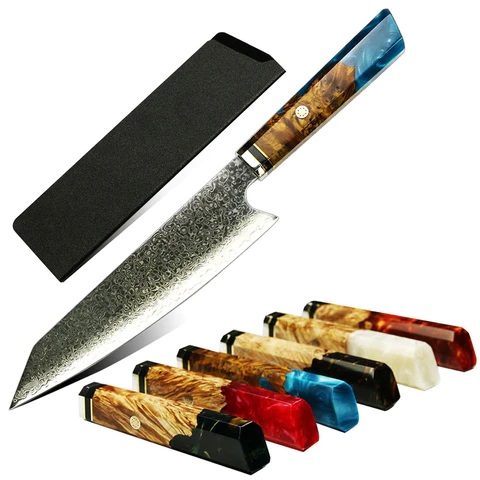
These attributes make Damascus steel knives more than a kitchen tool—they are a symbol of heritage, excellence, and beauty, revered by culinary professionals worldwide.
Caring for Your Damascus Knife
Owning a Damascus knife is a commitment to maintaining its exceptional quality and beauty. This section provides crucial guidance on preserving the functionality and aesthetic appeal of your Damascus steel, ensuring it remains a cherished tool in your culinary arsenal.
Maintenance Tips: Cleaning, Sharpening, and Storage
Proper care extends the life and performance of your Damascus knife. Here’s how to keep it in prime condition:
- Cleaning: Hand wash with mild soap and water, avoiding harsh detergents or dishwashers that can damage the steel.
- Sharpening: Use a whetstone or a specialized sharpener designed for Damascus steel to maintain the blade’s razor edge.
- Storage: Store in a knife block or magnetic knife strip, away from moisture and extreme temperatures.
These practices safeguard your knife’s integrity, ensuring it continues to offer peak performance.
Preserving the Aesthetic Appeal
The allure of a Damascus knife lies in its intricate patterns and luster. Preserve its unique beauty by:
- Regular Oil Application: A light coating of food-safe mineral oil protects against rust and keeps the steel vibrant.
- Avoiding Abrasive Materials: For cleaning, use a soft cloth to prevent scratches or damage to the pattern.
- Immediate Drying: After washing, dry your knife immediately to prevent water spots or oxidation.
By embracing these habits, you’ll uphold the aesthetic elegance of your Damascus steel, making it a centerpiece of your kitchen.
| Care Aspect | Do’s | Don’ts |
|---|---|---|
| Cleaning | Mild soap, soft cloth, immediate drying | Dishwashers, harsh detergents |
| Sharpening | Whetstone, professional services | Inappropriate sharpeners |
| Storage | Knife block, dry place | Loose drawers, humid areas |
| Aesthetic Maintenance | Food-safe oil, gentle handling | Abrasives, neglecting oil application |
Adhering to these care guidelines ensures that your Damascus knife remains a reliable and beautiful companion in your culinary adventures, reflecting the esteem and tradition it embodies.
The Science Behind the Sharpness
The exceptional sharpness of a Damascus knife is no mere happenstance; it’s a testament to centuries of metallurgical evolution and profound understanding of material science. This section delves into the scientific orchestration that gives Damascus steel its renowned cutting edge.
Metallurgy and Material Science of Damascus Steel
At the heart of every Damascus knife lies a complex structural integrity forged through precise science. The sharpness that chefs around the world prize is born from a harmonious blend of steel, metallurgy, and material science.
- Carbon Content: High carbon levels within the steel result in a harder blade, capable of being honed to a finer edge and maintaining this sharpness over prolonged use.
- Layering Process: The distinctive method of folding and forging the steel, sometimes hundreds of layers thick, contributes to its strength. This technique disperses micro carbides throughout the steel, reinforcing the blade’s structure at the molecular level.
- Heat Treatment: Critical to blade crafting, the process of heating and cooling the steel, known as tempering, achieves a balance between hardness (for cutting performance) and toughness (for durability).
Understanding these scientific principles illuminates the mastery behind Damascus steel knives. It’s not just the artistry in their patterns but the profound science embedded in their very core that sets them apart.
| Scientific Aspect | Role in Sharpness | Benefit to the Knife |
|---|---|---|
| Carbon Concentration | Enables finer sharpening | Sustained sharpness |
| Forging Methodology | Distributes strength-enhancing carbides | Enhanced durability |
| Thermal Processing | Balances hardness and toughness | Optimal performance and resilience |
This intricate fusion of art and science underscores why Damascus knives are an unparalleled choice for culinary professionals and enthusiasts alike, offering a slice of heritage with every cut.
Conclusion
In the culinary cosmos, Knife Damascus reigns supreme, a testament to timeless craftsmanship, artistry, and cutting-edge science. From the intricate patterns etched into every blade to the unparalleled sharpness that chefs cherish, Damascus knives are more than kitchen tools—they are exquisite symbols of culinary passion. This journey through their history, creation, and maintenance underscores their uniqueness and serviceability. Whether used in a bustling professional kitchen or the heart of a family home, a Damascus knife is not just about the cut—it’s about upholding a tradition of excellence.
FAQs section
What makes Damascus knives different from other steel knives?
Damascus knives are renowned for their distinctive patterned appearance, exceptional toughness, and ability to retain sharpness. These characteristics stem from the unique way Damascus steel is forged, blending several metal types and employing specialized techniques to create the signature wavy pattern on the blade.
Are Damascus steel knives good for everyday kitchen use?
Absolutely. Damascus knives are prized for their durability and sharpness, making them excellent for consistent culinary use. However, they do require proper care to maintain their edge and aesthetic appeal, like regular sharpening and hand washing.
How do I maintain my Damascus knife’s sharpness?
Regular sharpening with a whetstone is recommended to maintain the blade’s edge. It’s also advisable to use the knife on softer surfaces like wooden or plastic cutting boards to prevent premature dulling.
Can Damascus steel rust or corrode?
While Damascus steel is more resistant to corrosion compared to many other steels, it’s not entirely rust-proof. Proper care, like cleaning the knife after use and keeping it dry, is essential to prevent rust and maintain its pristine condition.
Is the pattern on Damascus knives purely aesthetic?
The pattern is a byproduct of the unique forging process and metal layering intrinsic to Damascus steel production. While it adds aesthetic value, it also signifies the blade’s complex structural composition and strength.
What is Damascus on a knife?
Damascus refers to a type of steel characterized by distinctive patterns on the surface, created by alternating layers of different metals, usually high-carbon and high-nickel alloys. This steel is commonly used in knife-making and other high-quality blade tools.
Is Damascus steel good for knives?
Yes, Damascus steel is highly regarded for knives due to its exceptional sharpness, durability, and ability to hold an edge. The layering technique provides a balance between hardness and flexibility, making it ideal for sharp and strong knife blades.
Are Damascus knives good knives?
Damascus knives are often considered excellent knives due to their sharpness, unique patterns, and overall performance. However, the quality of a Damascus knife depends not only on the steel but also on the craftsmanship and the skill of the blacksmith who creates it.
Why is Damascus so expensive?
Damascus steel is expensive due to the intricate forging process and the skill required to create the unique patterns. Additionally, the raw materials used, such as high-quality carbon and nickel alloys, are costly. The labor-intensive craftsmanship and the limited number of skilled artisans further contribute to the high price tag of Damascus steel knives.
Can Damascus steel rust?
Yes, Damascus steel can rust if not properly cared for. While it has a higher resistance to rust compared to some other types of steel, it is not completely rust-proof. Regular maintenance, such as drying the knife thoroughly after use and applying a thin layer of oil to prevent moisture exposure, helps prevent rusting.
Is Damascus steel waterproof?
No, Damascus steel is not waterproof. Like any other steel, it can be affected by water if not dried and maintained properly. It is essential to keep Damascus knives dry and clean to prevent corrosion and maintain their performance and appearance.
Frequently Linked Pages
1. Damascus Steel Knife – Damascus Steel Knife: Unveiling the Timeless Artistry and Its Majesty
2. Damascus Knifes – Damascus Knifes: A Symphony of Craftsmanship and Functionality
3. Kitchen Knives – Mastering the Cut: A Comprehensive Guide to Kitchen Knives
4. Knives Damascus – Mastering the Art of Culinary with Knives Damascus: A Comprehensive Guide




